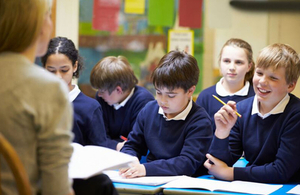One of the largest mental health trials launches in schools
The British government announced in February 2019 that it is recruiting 370 schools to join one of the largest trials in the world to boost the evidence about what works to support mental health and wellbeing. What’s being tried out is the ancient meditational practice of Mindfulness.
Mindfulness, popularized and empowered in this century by the Zen master Thich Nhat Hanh, is about quieting the body and nervous system through conscious breathing, conscious walking, conscious eating. This brings the scattered mind into alignment with the rest of the organism. The positive effects of this are being explored by a range of scientific disciplines, to establish the mechanisms behind the have a beneficial effects.
How will mindfulness and other relaxation techniques really work in school systems often based on a firm belief in the judgemental mind? Could it become punitive, obligatory and distasteful in some instances feeling unsafe and perhaps barring thoughts of meditation as a resource in the future?
What happens if a child moves into an intense experience of spiritual awakening? Will there be space for that? Will teachers be able to recognize what could show up as a spiritual emergency? Or could the child find herself at the doctors with medication and the recently-invented diagnosis depersonalization disorder? More than ever, there is a need to widen the availability of information on spiritual psychology or the psychology of conscious awakening. And perhaps to address the fundamental question of whether we should be teaching our children, or should they be teaching us?

The application of mindfulness in institutional contexts, especially towards our children, needs to be watched – not because spirituality is dangerous, but because it could be incompatible with a deeper ethos of control through fear, threat, and punishment. However, at this stage, it’s wonderful that the mental struggle of young people in conforming to a world which increasingly makes less and less sense is being recognized. It’s great that resources are going into the areas of mentorship and psychological attention, outside the parameters of acquiring knowledge. It’s even more deeply significant that

Children in parts of the UK will benefit from mindfulness exercises, relaxation techniques and breathing exercises to help them regulate their emotions, alongside pupil sessions with mental health experts. The study will run until 2021 and aims to give schools new, robust evidence about what works best for their students’ mental health and wellbeing.
Mr Hinds also confirmed the nine areas across the UK that will trial new high-quality mental health assessments for young people entering care, helping them get the support they need to meet their individual needs at a time when they are more vulnerable.
According to Education Secretary Damian Hinds:
Schools and teachers don’t have all the answers, nor could they, but we know they can play a special role which is why we have launched one of the biggest mental health trials in schools. These trials are key to improving our understanding of how practical, simple advice can help young people cope with the pressures they face.
To explore what works in schools to support young people’s mental wellbeing, the trials will test five different approaches. These include:
- Two approaches focused on increasing awareness in secondary schools through short information sessions either led by a specialist instructor or by trained teachers. These include a set of tools to increase understanding of mental health and mental disorders among both pupils and teachers.
- Three approaches in primary and secondary schools that focus on lighter-touch approaches such as exercises drawn from mindfulness practice, breathing exercises and muscle relaxation techniques and recognising the importance of support networks including among their own peers.
The mental health assessment pilots, also run by the Anna Freud Centre, will look at providing improved mental health assessments for children entering the care system. Currently an estimated half of all children in care meet the criteria for a possible mental health disorder, compared to one in ten children outside the care system, so these pilots – backed by £1 million announced last year – will identify the mental health and broader wellbeing needs of these children, including whether a referral to a more specialist service is needed.
Every day our frontline services see children and teenagers struggling to get to grips with how they fit into the increasingly complex modern world – contending with things like intense pressure at school, bullying or problems at home, all while being bombarded by social media.
Catherine Roche, Place2Be CEO
The Dalai Lama
My wish is that, one day, formal education will pay attention to the education of the heart, teaching love, compassion, justice, forgiveness, mindfulness, tolerance and peace. This education is necessary, from kindergarten to secondary schools and universities. I mean social, emotional and ethical learning. We need a worldwide initiative for educating heart and mind in this modern age.











